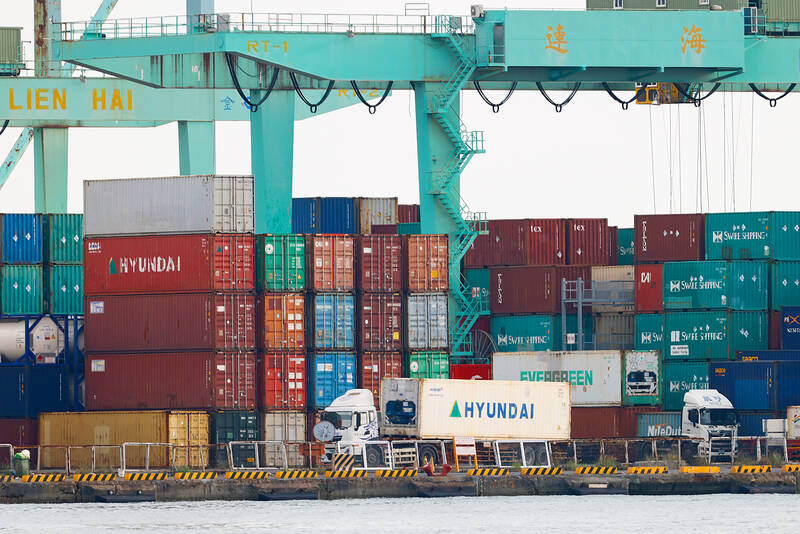Export orders last month expanded 30.5 percent year-on-year to US$70.22 billion, the eighth straight month of double-digit percentage growth and the highest ever for a single month, the Ministry of Economic Affairs said yesterday.
Last month’s figure increased 17 percent from the previous month, and exceeded the ministry’s estimate of US$64 billion to US$66 billion.
Stronger server orders drove the stronger-than-expected result, Department of Statistics Director-General Huang Wei-jie (黃偉傑) told a news conference in Taipei.

Photo: Ritchie B. Tongo, EPA
The ministry in a report said orders in the third quarter rose 23.8 percent year-on-year to US$190.69 billion, surpassing its forecast of US$184.5 billion.
In the first nine months of the year, export orders grew 22.3 percent to US$524.37 billion, also the largest for the period, it said.
Export orders this month are expected to fall 2.3 percent month-on-month to US$68.6 billion, or rise 0.5 percent to US$70.6 billion, the ministry said.
On an annual basis, orders are forecast to increase by 23.7 to 27.3 percent, it said.
Order momentum is expected to remain strong this quarter, supported by robust demand for artificial intelligence (AI) products and emerging technologies, Huang said.
Export orders could hit a record high this year, surpassing the previous record of US$674.1 billion in 2021, if orders this quarter reach US$149.7 billion, he said.
The optimism comes as worries about US tariffs and US-China trade tensions have eased, while several institutions have raised global economic growth forecasts for this year, he added.
While end-market demand has not rebounded significantly and China’s oversupply continues to weigh on traditional industries, AI remains a key growth driver for Taiwan, Huang said.
Regardless of the talks about an AI bubble, the main uncertainty is the outcome of a Section 232 investigation under the US Trade Expansion Act of 1962, he said.
Last month, export orders for electronic components surged 45.9 percent year-on-year, as AI and high-performance computing drove demand for integrated circuit production, design, packaging and memory orders, the ministry said.
Orders for information and communications technology products rose 33.1 percent, as strong demand from the AI and cloud service industries drove orders for servers and Internet communication products, while optoelectronic product orders climbed 11.2 percent, and machinery orders rose 11.4 percent due to strong demand for automation equipment in semiconductor production, it said.
In traditional industries, export orders for plastic and rubber products fell 10 percent, and orders for base metals dropped 6.3 percent, while chemical products rose 1.4 percent, ministry data showed.
US tariffs have continued to weigh on orders for plastic and rubber products, as well as machine tools, while base metals face low prices and oversupply from China, Huang said.
Chemical product orders rebounded as demand for medicine — especially from Japan — and petrochemical products increased, he added.

Japanese technology giant Softbank Group Corp said Tuesday it has sold its stake in Nvidia Corp, raising US$5.8 billion to pour into other investments. It also reported its profit nearly tripled in the first half of this fiscal year from a year earlier. Tokyo-based Softbank said it sold the stake in Silicon Vally-based Nvidia last month, a move that reflects its shift in focus to OpenAI, owner of the artificial intelligence (AI) chatbot ChatGPT. Softbank reported its profit in the April-to-September period soared to about 2.5 trillion yen (about US$13 billion). Its sales for the six month period rose 7.7 percent year-on-year

CRESTING WAVE: Companies are still buying in, but the shivers in the market could be the first signs that the AI wave has peaked and the collapse is upon the world Taiwan Semiconductor Manufacturing Co (TSMC, 台積電) yesterday reported a new monthly record of NT$367.47 billion (US$11.85 billion) in consolidated sales for last month thanks to global demand for artificial intelligence (AI) applications. Last month’s figure represented 16.9 percent annual growth, the slowest pace since February last year. On a monthly basis, sales rose 11 percent. Cumulative sales in the first 10 months of the year grew 33.8 percent year-on-year to NT$3.13 trillion, a record for the same period in the company’s history. However, the slowing growth in monthly sales last month highlights uncertainty over the sustainability of the AI boom even as

AI BOOST: Next year, the cloud and networking product business is expected to remain a key revenue pillar for the company, Hon Hai chairman Young Liu said Manufacturing giant Hon Hai Precision Industry Co (鴻海精密) yesterday posted its best third-quarter profit in the company’s history, backed by strong demand for artificial intelligence (AI) servers. Net profit expanded 17 percent annually to NT$57.67 billion (US$1.86 billion) from NT$44.36 billion, the company said. On a quarterly basis, net profit soared 30 percent from NT$44.36 billion, it said. Hon Hai, which is Apple Inc’s primary iPhone assembler and makes servers powered by Nvidia Corp’s AI accelerators, said earnings per share expanded to NT$4.15 from NT$3.55 a year earlier and NT$3.19 in the second quarter. Gross margin improved to 6.35 percent,

FAULTs BELOW: Asia is particularly susceptible to anything unfortunate happening to the AI industry, with tech companies hugely responsible for its market strength The sudden slump in Asia’s technology shares last week has jolted investors, serving as a stark reminder that the world-beating rally in artificial intelligence (AI) and semiconductor stocks might be nearing a short-term crest. The region’s sharpest decline since April — triggered by a tech-led sell-off on Wall Street — has refocused attention on cracks beneath the surface: the rally’s narrow breadth, heavy reliance on retail traders, and growing uncertainty around the timing of US Federal Reserve interest-rate cuts. Last week’s “sell-off is a reminder that Asia’s market structure is just more vulnerable,” Saxo Markets chief investment strategist Charu Chanana said in